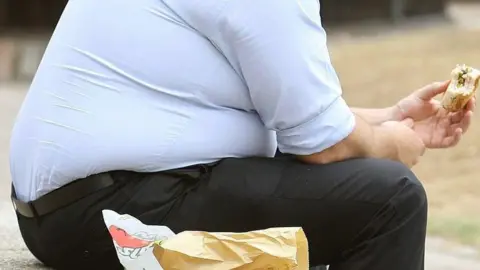 Getty Images
Getty ImagesSir Keir Starmer and his health secretary have been lauding the potential of the new generation of weight-loss drugs.
Given as regular injections, the treatments – Wegovy and Mounjaro – mimic a hormone that makes people less hungry.
Not only could they help reduce waistlines, the prime minister and Wes Streeting said, they could also hold the key to a thriving economy. Sir Keir told the BBC it was time to “think differently”.
He was speaking after it was announced a trial would be run by Health Innovation Manchester, a research group linked to the NHS, and drug firm Eli Lilly to see if the weight loss drug Mounjaro could help get obese people back into work.
Obesity is, without doubt, a major burden on the health service and wider economy.
Obesity-related illness costs the NHS an estimated £11bn a year – about 8% of its spending. Add in lost productivity, and research has shown it costs the economy nearly £100bn a year – or 4% of gross domestic product (GDP), a measure of all the economic activity in the country.
Quick fix
So it is understandable there is huge hope these drugs could be the answer.
After all, the search for a solution to expanding waistlines has eluded successive governments since the early 1990s.
Promoting healthy lifestyles, improving food labelling, restricting advertising and taking steps to increase the cost of unhealthy foods, such as the sugar tax, have all been tried – but rates of obesity have continued to rise and one in three adults is now obese.
Critics say governments have not gone far enough with these initiatives, while pointing out public health spending has been squeezed in the past decade, hampering the ability of healthy lifestyle programmes to have an impact.
And despite the undoubted benefits the weight-loss drugs demonstrate, health experts have warned they should not be seen as a quick fix.
 PA Media
PA MediaFirst, the NHS has tightly restricted their use for weight loss – versions of the drugs are also for diabetes.
Wegovy, the brand name for semaglutide, is only available as a weight-loss drug for people who are severely obese and living with other health conditions. And it is only allowed to be given under the supervision of specialist weight loss programmes, access to which is like many NHS services constrained.
Mounjaro, meanwhile, is not yet being used by the NHS as a weight-loss treatment – although, the official drugs-advisory body has proposed it should be.
The criteria look likely to be similar, with the exception it may be made available more widely in the community, without the need for specialist supervision.
And how that can be achieved remains to be seen – as patients still need to follow a structured programme of diet and exercise alongside the treatment.
GPs are worried they do not have the capacity to oversee this – and so a range of options are still being explored. And the NHS has warned it could take years for Mounjaro to be rolled out.
There is also concern the drugs could encourage a “dependency culture”, where people do not bother with healthy eating and exercise – something Streeting himself has acknowledged.
‘Skinny jab’
Second, even if the NHS was to expand access, it is not clear drug manufacturers could keep up.
Shortages of Wegovy and Ozempic, the version of semaglutide used for diabetes, have been reported, partly due to a boom in demand on the private market, driven by celebrities endorsing their use as the “skinny jab”. The result has been that many NHS clinics have struggled to provide them to all the patients they would want to.
And then in terms of the rising numbers of people out of work because of illness, the role of obesity is complex to work out.
The numbers not working because of ill health have risen since the pandemic, hitting 2.8 million last year.
But data from the Office for National Statistics shows the most common primary factors are mental health problems and musculoskeletal conditions, affecting the joints, bones and muscles.
Many will also have weight problems – but tackling that may be only one part of the answer to them returning to work.



